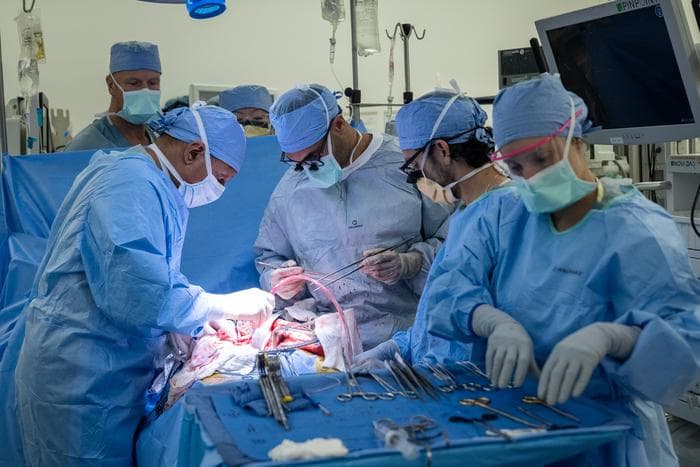Medical milestone: World’s first human bladder transplant successfully performed
A surgical team from USC and UCLA has made medical history by performing the world’s first human bladder transplant, opening a new frontier in transplantation medicine. The groundbreaking procedure, completed on May 4, 2025, at Ronald Reagan UCLA Medical Center, represents a culmination of years of research and surgical innovation.

Inderbir Gill, MD (L) and Nima Nassiri, MD (C) perform the world’s first-in-human bladder transplant.
Surgical pioneers behind the breakthrough
The historic operation was led by Dr. Inderbir Gill, founding executive director of USC Urology, and Dr. Nima Nassiri, urologic transplant surgeon at UCLA Health. Their collaboration spans years of meticulous research, pre-clinical procedures, and regulatory approvals to make this medical milestone possible.
“This surgery is a historic moment in medicine and stands to impact how we manage carefully selected patients with highly symptomatic ‘terminal’ bladders that are no longer functioning,” noted Dr. Gill, who also serves as Chair and Distinguished Professor of Urology at the Keck School of Medicine of USC.
Complex procedure with immediate results
The surgical team performed a combined kidney and bladder transplant on a patient who had been dialysis-dependent for seven years after losing most of his bladder to cancer and subsequently having both kidneys removed due to renal cancer. The intricate eight-hour procedure involved:
- Transplanting the kidney
- Transplanting the bladder
- Connecting the new kidney to the new bladder
According to Dr. Nassiri: “The kidney immediately made a large volume of urine, and the patient’s kidney function improved immediately. There was no need for any dialysis after surgery, and the urine drained properly into the new bladder.”
Potential paradigm shift in treating bladder dysfunction
This innovative approach could transform treatment options for millions suffering from severe bladder dysfunction. Current treatments for terminal bladder conditions typically involve using portions of a patient’s intestine to create a new bladder or urine pathway – procedures that come with significant complications.
“A bladder transplant delivers a more ‘normal’ urinary reservoir and may circumvent some of the challenges associated with using the intestine,” explained Dr. Nassiri.
The primary challenges remain the body’s potential rejection of the transplanted organ and managing the side effects of immunosuppressive medications. Currently, ideal candidates include patients who already have an organ transplant or those requiring both kidney and bladder transplants.
Years of research and technical innovation
The procedure overcame considerable technical hurdles, particularly navigating the complex vascular structure of the pelvic area. The surgical team conducted numerous practice transplantations at Keck Medical Center of USC, including first-ever robotic bladder retrievals and successful robotic transplantations in recently deceased donors.
The bladder transplant was performed as part of a UCLA clinical trial, with Drs. Gill and Nassiri planning additional procedures in the near future, potentially establishing a new standard in treating severe bladder conditions.

